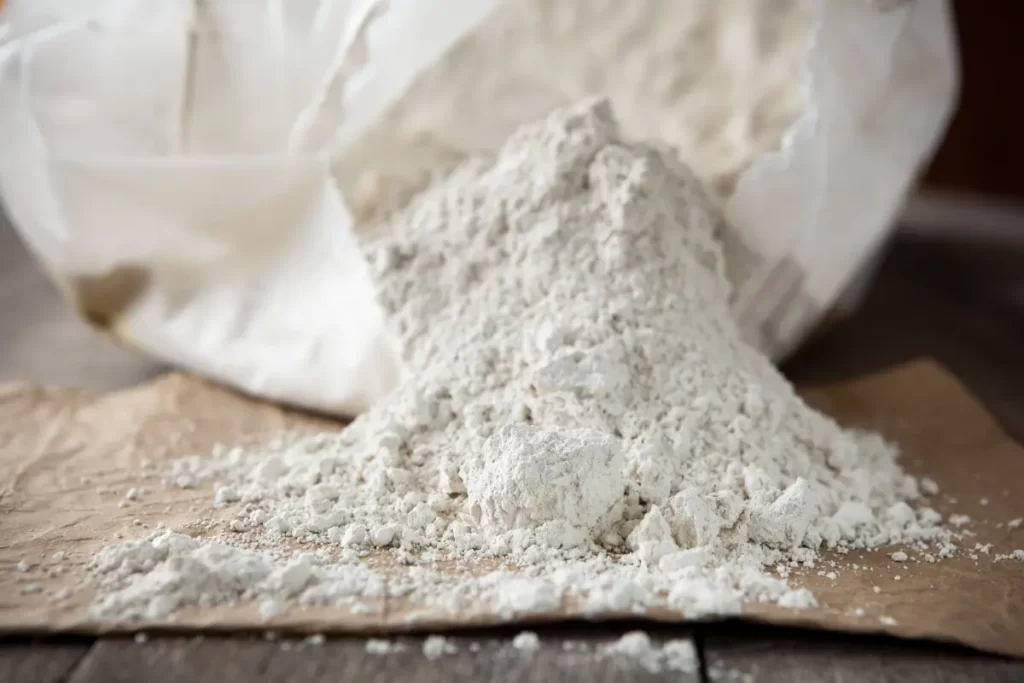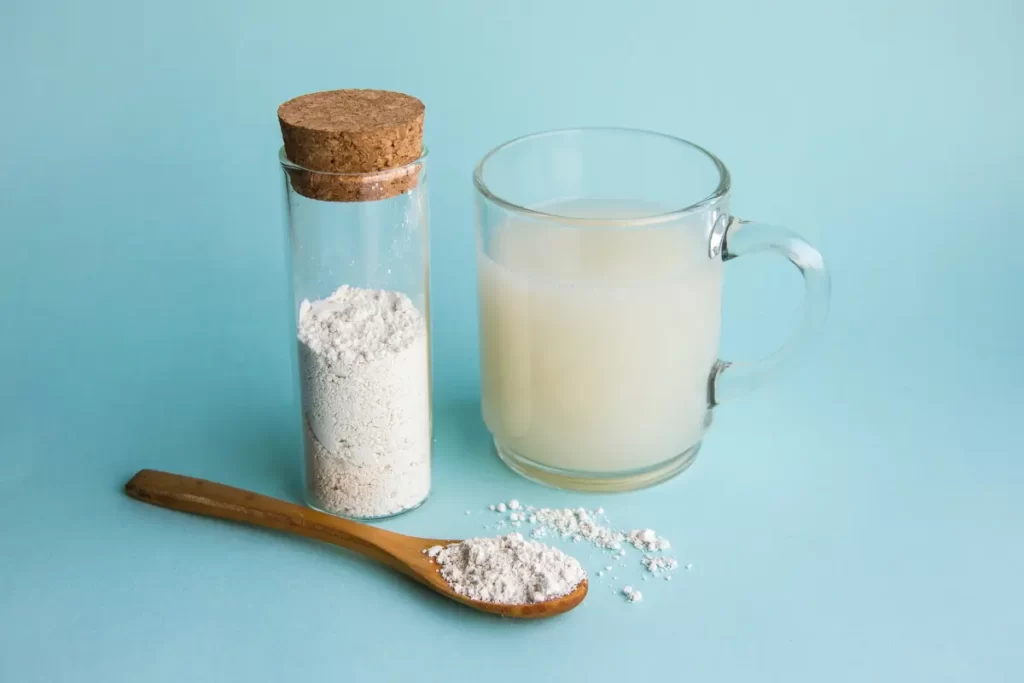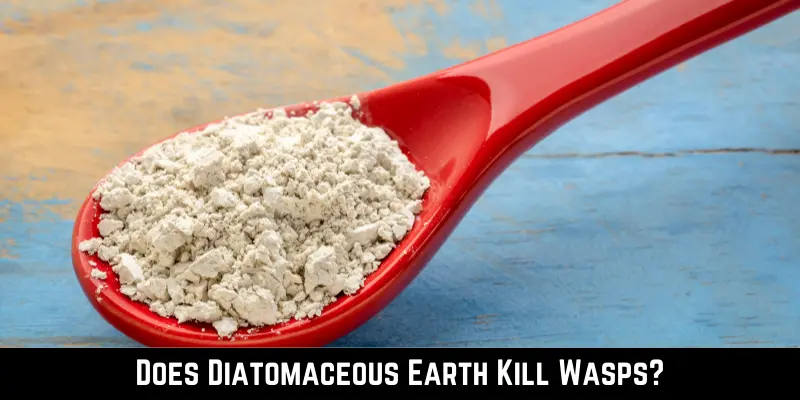Finding a wasp is not an amusement, especially if it starts irritating you. Getting it out of your home or property is always a challenging task. There are numerous methods to deter wasps, but have you heard of diatomaceous earth? Does diatomaceous earth kill wasps?
Yes, diatomaceous earth kills wasps quite effectively. It is a naturally occurring mineral that you can get from the fossilized form of the algae known as diatoms. Additionally, you can also find it in powder form and kill any insects that come into touch with it, including wasps.
Do you want to employ diatomaceous earth to kill wasps? If so, read the below guidelines to know everything about diatomaceous earth.
Diatomaceous Earth; What’s it?

According to the Journal MDPI, diatomaceous earth is a naturally occurring, soft, siliceous sedimentary rock. You can easily crush it into a fine, off-white to white powder. It is made up of fossilized hard silica shells of single-celled diatoms. These tiny cells have been around in aquatic settings for millions of years.
Additionally, diatomaceous earth is essential for numerous biological activities because of its chemical composition. Moreover, due to its abrasive and absorbent properties, it serves multiple functions. Some of its functions are described below:
- It helps remove small particles and contaminants from water and swimming pool filters.
- Due to its abrasive nature, you can find diatomaceous earth in several goods, including toothpaste, facial washes, and metal polishes.
- Moreover, you can apply it in your agriculture fields to prevent soil erosion and control pests.
Above all, while using diatomaceous earth, choose the appropriate grade for the intended usage.
Difference between Diatomaceous Earth Food Grade & Insect Killer

Diatomaceous earth (DE) is a naturally occurring substance made from the fossilized remains of the little aquatic organisms known as diatoms. According to the Journal of Stored Products Research, diatomaceous earth is an effective substitute for traditional pesticides. You can use it as an insecticide and a food-grade supplement.
The main difference between food-grade DE and industrial DE is that food-grade contains less than 1% crystalline silica, while industrial DE consists of up to 40% crystalline silica. Food-grade diatomaceous earth is derived from freshwater sources. On the other hand, you can find insect-killing diatomaceous earth in both freshwater and saltwater environments.
Moreover, food-grade diatomaceous earth is not harmful to humans and animals. While insect killer diatomaceous earth is best as an insecticide. For the task at hand, it is crucial to use the appropriate type of diatomaceous earth. Using insect-killing diatomaceous earth for human nutrition might be problematic due to the potential for impurities or toxic compounds. So, always beware while using such insecticides.
How Can You Use Diatomaceous Earth to Kill Wasps?
Diatomaceous earth is a very effective wasp and insect deterrent. Below are some ways that you must follow to use diatomaceous earth in the most suitable way to deter wasps.
- Before using diatomaceous earth, you must first determine the precise location of the wasp’s nest. Wasps and hornets adore creating their nests in low-lying, dark, shady areas, like those found beneath steps, decking, patios, patio furniture, BBQ grills, or eaves. If you notice any wasp activity in these areas, apply DE to get rid of them.
- When insects search these areas for suitable nesting sites, the diatomaceous earth will attach to their exoskeleton and pull out the lipid oils, fatally dehydrating them before they can send pheromone signals to other wasps or hornets.
- Although this method is effective in killing wasps, diatomaceous earth works well when you cover the whole area with it. Make sure to repeat this procedure every 4 to 5 weeks and inspect your yard regularly.
Above all, always wear protective clothing, gloves, and a mask while applying diatomaceous earth to protect yourself.
Is It Good to Apply Diatomaceous Earth Wet or Dry?

You can apply diatomaceous earth either wet or dry but it all depends on the specific use and target pest. However, the best way to apply diatomaceous earth is dry. Because dry diatomaceous earth is more abrasive when it comes into touch with soft-bodied insect pests, dry application is more successful at killing and controlling insects and other pests.
Since water will lessen diatomaceous earth’s abrasive impact, wet application is often not as effective. Additionally, wet diatomaceous earth can clump or discolor and be challenging to spread uniformly. However, wet diatomaceous application could be useful in some circumstances.
Point to ponder: If you’re using diatomaceous earth to control pests, try to use food-grade diatomaceous soil, which is safe for both people and animals.
How Long Does Diatomaceous Earth Take to Kill Wasps?
Diatomaceous earth typically takes around 24 hrs to kill wasps. It functions by dehydrating and finally killing insects with an exoskeleton, such as wasps.
It’s important to note, however, that the maximum time it takes to kill wasps is 24 hours, it depends on several factors, including the environmental conditions, size and type of wasp, the quantity of DE used, and the way of application.
Moreover, it gradually weakens their protective covering over time, causing the wasp to eventually become unable to survive. When utilizing diatomaceous earth to control wasps, it’s vital to realize that it may not give you an instant remedy. Wasps are flying insects, and diatomaceous earth works best against crawling insects.
When Should You Apply Diatomaceous Earth?
The best time to apply diatomaceous earth varies based on location and specific use. You can use diatomaceous earth indoors at any time of the day, but, it’s important to focus on the areas where you’ve observed pest activity.
However, utilizing diatomaceous earth in the morning or early afternoon is a good choice because of the lower humidity of air at that time. It can remain effective and dry because of this. Avoid using diatomaceous earth while it’s raining or when the humidity is particularly high. Its efficiency may be diminished by moisture.
Additionally, wearing a dust mask while applying diatomaceous earth is a good idea to prevent breathing in tiny particles, especially in dry, windy circumstances.
How Long Does the Diatomaceous Earth Stay Active?
As a pest control substance, diatomaceous earth stays active as long as it remains dry. DE loses its pest-repelling power when it becomes wet. That’s why DE can induce dehydration and death in insects and other arthropods by physically abrading their exoskeletons. When it becomes wet, it clumps up and loses some of its abrasiveness.
If you apply diatomaceous earth inside your home, it can last for a long time. However, if you’re using it outside, you may need to reapply it frequently. It is because it may be exposed to moisture from irrigation, rain, or snow outside the house.
Moreover, Be aware of the other factors, such as the pest you’re seeking to manage and the specific circumstances in which you are using diatomaceous earth. All these factors impact the efficacy of DE earth. Therefore, you should follow the manufacturer’s instructions for good results.
Does Diatomaceous Earth Work Instantly?
No, diatomaceous earth doesn’t work immediately to kill wasps. It almost takes 20-24 hours for diatomaceous earth to start working against insects. Diatomaceous earth may take several days to weeks to begin working on insects like fleas or bed bugs. After reacting properly to wasps, it will give you the desired effects.
Diatomaceous earth works best in dry conditions. Therefore, you shouldn’t apply it in areas where it can get wet or where there is a lot of humidity. Remember, if you’re using diatomaceous earth for a specific task like wasp control, make sure to apply it according to the manufacturer’s instructions.
Final Thoughts
Wasps are one of the most challenging household insects. They quickly multiply, particularly if they build a nest in your house or yard. Although there are several ways to get rid of wasps, diatomaceous earth is one of the most effective techniques.
The best way to use diatomaceous earth is in dry form, while you can also use it in liquid or powder form. Hopefully, the above guidelines will help you in using diatomaceous earth to deter wasps. Above all, remember that if you have a massive wasp infestation in your home, don’t try to resolve the situation yourself. Rather, ask for help from a professional pest control company.
FAQs
References
Zeni V, Baliota GV, Benelli G, Canale A, Athanassiou CG. Diatomaceous Earth for Arthropod Pest Control: Back to the Future. Molecules. 2021; 26(24):7487. https://doi.org/10.3390/molecules26247487

